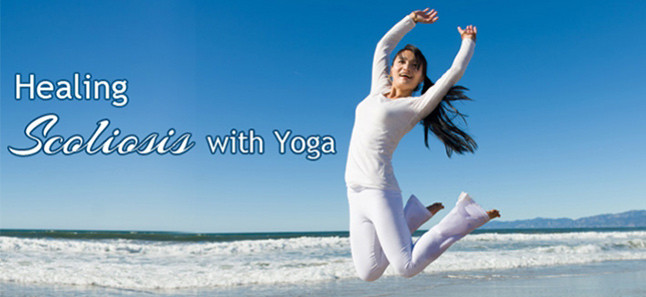The human spine is formed of multiple vertebrae which protect and support the spinal cord. This set of bones are responsible for the ability to stand in an upright position. In Scoliosis, a condition particularly related to the spine, the individual’s spine is not straight but rather curved. A person whose spinal curvature is more than 10 degrees to the right or left, or even front or back can be a victim of Scoliosis. This particular deformity is observed amongst at least 0.5% population across the world and has more chances of occurrence amongst women.
Contents
- 1 Veerbhadrasana (Warrior pose)
- 2 Trikonasana (Triangle pose)
- 3 Marjariasana (Cat pose)
- 4 Shishuasana (Child pose)
- 5 Paschimottanasana (Seated forward bend)
- 6 Adho Mukha Svanasana (Downward facing dog pose)
- 7 Setu Bandhasana (Bridge pose)
- 8 Shalabasana (Locust pose)
- 9 Sarvangasana (Shoulder stand)
- 10 Shavasana (Corpse pose)
Corrective measures
Scoliosis restricts the individual’s movement capabilities and can be utterly painful. While surgery is a popular option for people suffering from Scoliosis, it is also advised to look into other forms of corrective measures before going under the knife. Of the various options available today, yoga is one which has been around for probably the longest time and is also very effective. An ancient technique that not only helps at a physical level but also works at the mental level, rendering courage and patience to overpower the pain associated with Scoliosis.
Bracing for change
The spine bears most of the weight of the body and hence is under constant stress. In the case of Scoliosis, this stress aggravates the pain further. Yoga helps strengthen the leg muscles, thus taking off a considerable amount of stress of the spine. Yoga is a mix of breathing techniques and different postures specifically aimed at correcting the spine’s shape. It may cause a bit of pain initially as the body gets adjusted to the postures, but will eventually subside and help you a long way. So, let’s get started with some simple yoga postures that will get your spine back in proper shape and rid you of Scoliosis.
Veerbhadrasana (Warrior pose)
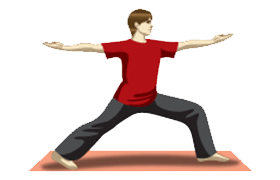
True to its name, the Warrior pose brings courage, grace and peace to the body. It also strengthens the lower back, improves balance in the body and enhances the stamina. A stronger back and will can be of great help when dealing with Scoliosis.
Trikonasana (Triangle pose)

The Triangle pose is a standing pose that stretches the spine and increases mental and physical equilibrium. It also reduces stress and back pain, letting the pain subside.
Marjariasana (Cat pose)
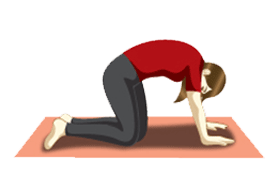
The Cat pose is done on all fours. It adds more flexibility to the spine, improves blood circulation and relaxes the mind and is very good for those suffering from Scoliosis.
Shishuasana (Child pose)
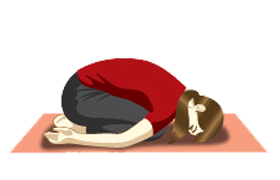
Another sitting pose, the Child pose calms the nervous system and also relaxes the back. This particular pose is ideal for the people who suffer from Scoliosis as a result of neuromuscular condition.
Paschimottanasana (Seated forward bend)
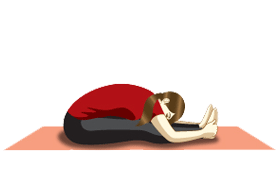
This pose stretches the lower back and relieves stress. It also reduces anxiety and fatigue and calms the mind.
Adho Mukha Svanasana (Downward facing dog pose)
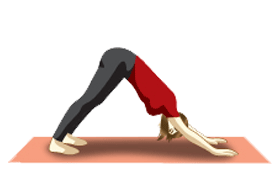
This yoga posture lengthens the spine and brings strength throughout the body, especially the arms, shoulders, legs and feet. Due to the help of this pose, the weight of the body can be distributed better to the legs and thus take stress off the spine.
Setu Bandhasana (Bridge pose)
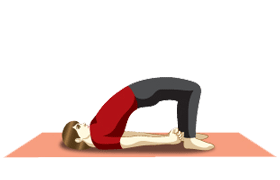
This posture stretches and strengthens the spine and back muscles. It also reduces anxiety and stress and calms the brain.
Shalabasana (Locust pose)
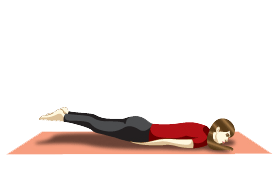
The Locust pose adds flexibility and strength to the entire back. It also relieves the body of stress, fatigue and lower back-pain.
Sarvangasana (Shoulder stand)
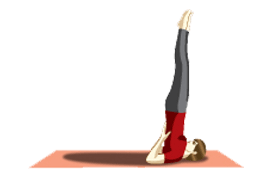
The Shoulder stand makes the spine flexible and strengthens the arms and shoulders. This yoga pose also relaxes the mind.
Shavasana (Corpse pose)
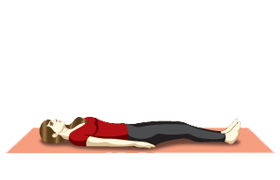
End your yoga practice by lying down in the Corpse pose for a couple of minutes. This pose takes the body into a state of meditation and is also rejuvenating.
Pranayama and meditation
Yogic breath pranayama and Nadi Shodhan pranayama can help a lot to expand lungs as they stretch and strengthen chest muscles. The Panchkosha meditation helps accept the situation proactively and improve awareness and patience. Hari Om or Chakra Meditation help cleanse and energise ‘chakras’ and ‘naadis’ which in turn facilitates smooth flow of ‘prana’. Doing meditations with back support may make it easy initially.
Patience is the key
Like any other practice, the effects of practising yoga will show with time. Have patience and be consistent with your practice. You can join a local Art of Living Yoga course and learn more postures specific to healing Scoliosis. Practising yoga in a group is also a great way to unwind and is quite popular these days.
Respect your limits
Yoga requires a certain amount of physical exertion and thus you are advised to proceed with caution. Don’t stress your body or push your limits too much. Regular yoga practice will help increase your ability with time. Stretch only as much as your body can comfortably and relax there.
Optimism helps!
Scoliosis can be handled better by keeping a more optimistic outlook towards life. Speak to your friends and family, their support can help keep your spirits high. Have patience and faith in your practice, be consistent and enjoy it to the fullest.
Yoga practice helps develop the body and mind bringing a lot of health benefits yet is not a substitute for medicine. It is important to learn and practice yoga postures under the supervision of a trained Art of Living Yoga teacher. In case of any medical condition, practice yoga postures after consulting a doctor and an Art of Living Yoga teacher. Find an Art of Living Yoga course at an Art of Living Center near you. Do you need information on courses or share feedback? Write to us at [email protected]
[“source-Artofliving”]

